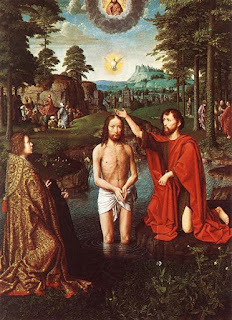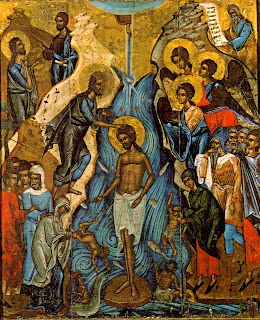A Sermon for the First Sunday after the Epiphany
January 10, 2021
The Rev. Robin Teasley
John the baptizer appeared in the wilderness, proclaiming a baptism of repentance for the forgiveness of sins. And people from the whole Judean countryside and all the people of Jerusalem were going out to him, and were baptized by him in the river Jordan, confessing their sins. Now John was clothed with camel’s hair, with a leather belt around his waist, and he ate locusts and wild honey. He proclaimed, “The one who is more powerful than I is coming after me; I am not worthy to stoop down and untie the thong of his sandals. I have baptized you with water; but he will baptize you with the Holy Spirit.”
In those days Jesus came from Nazareth of Galilee and was baptized by John in the Jordan. And just as he was coming up out of the water, he saw the heavens torn apart and the Spirit descending like a dove on him. And a voice came from heaven, “You are my Son, the Beloved; with you I am well pleased.” Mark 1:4-11
Wednesday was the Feast of the Epiphany. Epiphany is a Greek word that means to appear, to be revealed, or manifested. The feast day celebrates the manifestation of the long-awaited Messiah to the Gentiles, revealing the light of the world to all nations.
As Christians we might wonder if it was coincidence that the Capitol was invaded on the Feast of the Epiphany. So much was revealed, so much continues to be made manifest about the state of our nation. Perhaps much is also being revealed about who we are as Christians as we respond to what we are witnessing.
Life in a pandemic is hard enough but then when our very democracy is threatened, we find ourselves overwhelmed and unsure, perhaps angry, perhaps fearful. Clergy in pulpits everywhere this morning are trying to make sense of what happened on Wednesday. At the same time we are all too aware that there are differing opinions among our parishioners about what happened, and we also know that there are people who just want to worship and forget all about the cares of the world for an hour. What would God have us ponder together?
Some people believe the church and state should remain separate at all times, no exceptions. Some people think the two are very much connected. And I would guess most people fall somewhere in between these two groups. This is evident in so many churches, like ours for example. We have the American flag in a place of honor, we pray for our service men and women, our Book of Common Prayer contains prayers for our government, yet we are not so fond of politics being preached from the pulpit.
The majority of people in the middle usually hold the view that there is a gray area between the church and the state, and it’s not always clear, not always well-defined. As Christians, we know that it’s only as we spend time in prayer and in scripture, that we can begin to discern how to live as Christians and as citizens, with one foot in the earthly kingdom and the other foot in the heavenly kingdom.
This relationship between church and state has been an ongoing debate ever since the church was founded; martyrs have been slain, wars have been fought, world leaders have been given great and dangerous power, and empires have fallen, over and over. What we see in history and in scripture is that government is not always good, people are not always model leaders or citizens, and the challenges of life can create desperate situations that cause people to react in ways that cause harm, suffering, and even death.
The story we hear at Epiphany, of the magi seeking for the new king, reveals just what lengths King Herod would go to in order to keep his throne and his power. We are all a people in need of a Savior, and that is perhaps more uncomfortably evident than ever in this moment in our history.
I don’t have a solution to all the problems before us in our country right now. No one person does, which is why we must learn to collaborate to solve our problems. We are not all going to agree on any one solution.
But there is something that we as Christians can agree on and it is this. By virtue of our baptism, we are children of God. And at our baptism we commit to live as Christians, as followers of Jesus. The vows we make at our baptism help us to understand what it looks like to follow Jesus, not only inside the Church, but also in the world. The things we do and say as Christian citizens have great consequences. Either we are following Jesus, or we are misleading the world by our words and actions. To misrepresent Jesus is sin.
The Baptism of Christ (central section of Triptych of Jan des Trompes)
Gerard David, c.1505
At his baptism, Jesus stepped into the muddy water of the Jordan River with all the other sinners, and Jesus wades into the same muddy water of our lives. Jesus joins us in our messiness, revealing God’s plan to us and inviting us become part of the household of God.
When we are baptized, we vow to walk in the way of Jesus, through the muddy waters of discord that are a part of life, through the deep waters of chaos out of which God creates new life, and through the cleansing waters that unite us with one another. This connection we have with one another, through the power of the Spirit, is stronger and deeper than any other claim on our lives. It is stronger and deeper than race, gender, socio-economic status, nationality, or political party.
We are muddy, Jordan River people in need of Christ’s cleansing, saving love. When the heavens were torn apart Jesus was identified as God’s beloved Son. This moment of epiphany reveals to us that God will come to us again and again, ripping through our forgetfulness, our unconscious apathy, even our outright sinfulness. At our baptism God breaks into our lives, calls us beloved, and invites us to follow Jesus in the way of love.
To embrace the reality of our baptism, is to embrace the truth that we are united, interdependent, and responsible for one another, especially when life becomes unimaginable, unpredictable, and uncontrollable. To embrace the reality of our baptism and take hold of the power it gives us, even as we walk through the darkest days of pandemic, racial injustice, and political strife, we must remember our baptismal vows, and the responsibilities that are ours as beloved children of God. When we make the decision to live our lives as Christians first, daily imagining the waters of baptism still dripping from our bodies, then we will be empowered to love God and neighbor, and we will follow Jesus, and only Jesus.
Title Image: Bautismo de Cristo, Navarrete el Mudo











Comments
Post a Comment